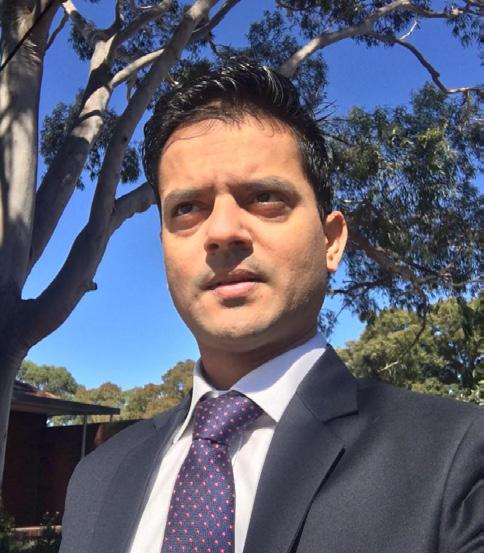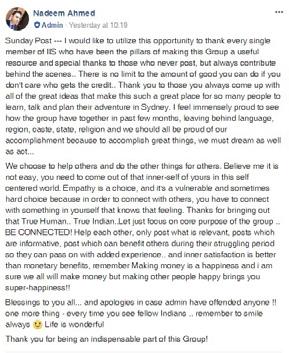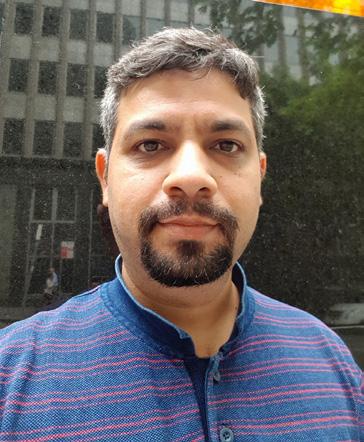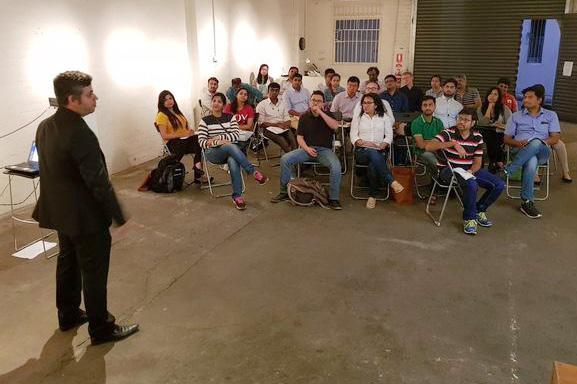
7 minute read
RETURNING PURSE, WITH GROUP’S HELP >
from 2017-12 Perth
by Indian Link
In July, banking professional Mayank Jain won praise after he helped return a purse containing bank cards and about $600 to a woman who had forgotten it on a train.
After finding the purse, Mayank wrote a post on Indians
In Sydney, asking what he should do.
In no time, Mayank got a string of suggestions that ranged from contacting the bank, handing over the wallet to the train station manager and approaching the police. He chose the last option.
“I went to Riverstone police station and handed over the wallet to them,” he said. Mayank kept updating the Facebook post about how he was going about returning the purse. Those who saw the post heaped him with praise. One person shared how they had also recently found a purse and returned it after tracing its owner through Facebook.
Then, around 10 pm on the same day, Mayank got a call from the police, saying that they had located the owner of the purse. “The policeman told me that scheduled to fly overseas the next day and had been saving the money to buy her husband a present,” he said.
“Good job, mate. Keep up the good work,” said a commentator on IIS.
“Imaandari zinda hai (honesty is alive). Proud of you, Mayank,” added another. Mayank, 37, however shrugged it off, saying what he did wasn’t ‘a big deal.’ “I have been a student, so I know how hard saving money is. I just did what I thought was the right thing to do,” he said. As the group members thanked Mayank for restoring their faith in humanity, one person summed it up, saying, “If my wallet ever gets lost, I hope you are the one who finds it!” of us are first-generation migrants. We are far away from our motherland and that is what binds us together. We can put ourselves in others’ shoes and have sympathy for each other. We help rather than trying to pull each other down,” he said.
True enough, many retweeted and shared Bindra’s tweet, a factor that undoubtedly prodded the authorities to act. Each step forward - financial milestones, insurance company taking note, Indian authorities promising to act - was posted on the group. Vikramjeet, on his part, was grateful too.
“First, I thought I was all alone,” he said. “But now I feel the whole world is standing behind me.”
No wonder then, that the group members were excited about the impact the campaign had had. “Great effort from everyone,” a member commented. “Unity rocks.”
FERRYING PARENTS, MEDICINES, GOODS >
In October, a group member Vicky Vikas posted a message on the group, saying that he was travelling to India and would be willing to help anyone with ‘parents, medicines etc.’


It was a simple enough post, but the spirit behind it left members applauding Vikas.
Many people from the group sent him requests to carry some goods. As Vikas responded to the comments, one member asked him why he was doing this. “The group helped me when I was in need of medicines for my mom,” Vikas wrote. “Just wanted to return the favour.”
In fact, there are many posts on the group asking fellow members if they would be willing to accompany ageing parents from India to Australia or back. For many, asking members on social media groups to be travel companions to their senior mum or dad is quickly becoming something of a standard practice.
Often enough, someone responds, either by volunteering to be the seniors’ companion or giving helpful advice, for instance, which airline to take so that the parents would be well taken care of.
Requests to bring medicines - again, mostly for parents or other visiting seniors in the family - are also fairly common. Some months ago, Neer Vish was coming back to Australia from India and asked the group members if he could help bring some stuff over.
While he did get a few requests, it was his gesture that won him praise. “It’s no big deal,” Vish explained in a comment. “I may need help in the future so just paying it forward.”
COMMUNITIES FOR JOB ASPIRANTS >
Browse long enough through any Facebook group about recent migrants and you are bound to come across posts from people looking for a way to crack into the job market. Many of these posts betray a sense of urgency, desperation, and, in some cases, downright alarm: new migrants running out of savings from India with no job in sight in Australia. The financial situation may not be dire for others, but it is certainly frustrating as they face rejection after rejection.
Desi Referral Network is one such community that has thrown the veritable lifeline to quite a few such people. With advice about tailoring one’s CV for the Australian market, job hunt and networking strategies and job postings as well, it is a great resource for new arrivals and job aspirants.
One recent post on the group was by a member who had got a job after threeand-a-half months of struggle during which they claimed to have sent out over 600 CVs to potential employers. “This was the toughest time of my life and I want to assure all of you who are struggling right now that you will get a job in your field. It’s just a matter of time.”
Another member posted that they were about to give up, ‘although I couldn’t afford to give up,’ when they came across the group. “It really gave me instant energy, giving hope that this is going to work,” they said, adding that they got information about a job vacancy and a reference. This finally helped the member land a job.
Gaurav Wadekar knows this drill all too well. A business analyst himself, he also runs a meetup group for new migrants and job seekers, although not particularly from India.

“I thought I was good at my business analysis skills, so started a meetup called Australian Business Analysts in June. Four people came, all looking for jobs. That’s when I realised there would be many such people, so I started the meetup called Finding A Job In Australia,” Gaurav said.

He said he started getting calls from people saying they hadn’t been getting
WHEN INDIAN MUMS CONNECT >
If you are an Indian-origin mum living in Australia, you’re most likely a part of an ‘Indian Mums’ Facebook page (Indian Mums Connect, IMC Sydney, IMC Brisbane, IMC Gold Coast, Desi Mums in West Melbourne, Connecting Indian Mums Melbourne).

You’ve no doubt marvelled at the information disseminated on these pages, and have most probably been motivated to contribute yourself.
As information and communication platforms, these vibrant pages are fast becoming the go-to place for your queries, indispensable particularly for new migrants. A wide variety of topics are discussed. “Eggless cakes” are a recurring theme for some reason, but so are women’s health issues, babies’ and childrens’ health matters, hot-housing of primary school kids (online resources for maths practice? Hindi lessons? Martial arts?) contraception-related matters (where can I get a morning-after pill?), house help, travel advice, even advice on interfering in-laws and recommendations for divorce lawyers. The suggestions pour in in a matter of hours, sometimes minutes. With the quantity and quality of knowledge contributed, it is becoming a valuable support mechanism as we negotiate the demands of our fast-paced lives. Electronic word-of-mouth, you can say, does wonders.
One brave young woman is currently vlogging her way through her cancer treatment - and to see the massive outpouring of love and concern and prayers and virtual hugs from the online community, can only raise your faith in humankind.
True, the advice can sometimes be inauthentic (beware of migration advice from non-professionals, or medical issues dealt with in outlandish suggestions from alternative therapies such as “Skin rash? Apply chandan”). But overall, the users have themselves stated more than once, the groups are “better than Google.”
Clearly, Facebook can be more than “look at how much fun I am having.”
It can help reinforce local relationships, and indirectly, local identities. Rather interview calls. “I looked at their resumés, helped them align their skills with the job requirements, gave them networking and interview strategies. I have been able to place about 15 people in the last four months,” he said, adding that while most of the jobs have been in IT, others have been in financial services, retail and construction.
“There is no one-size-fits-all approach. I have to research for each sector to see what kind of opportunities are available. I also speak to the people who approach me to analyse what skills they have, what kind of experience they have, what their present circumstances are. So, it’s a very tailored strategy,” he said.
While most of Gaurav’s work is face-toface with a candidate, the initial contact is often on, or because of, the online meetup group that he has created.
The group also organises monthly meetups in which guest speakers talk on a relevant topic (how to write a resumé and cover letter, networking tips and so on) and where one can meet fellow job seekers and exchange notes.
Of course, there are many who still struggle to find jobs after moving to
Australia. This phase of uncertainty can stretch for months, and it’s easy to fall down the pit of hopelessness. For such people, the group can be a job referral network, or at least an agony aunt. And then there are those who finally land a job, and immediately write a post on the group, detailing their journey and urging others not to give up. One such recent post by Harshad Barge touched the hearts of many.
Barge detailed how he worked casual jobs and struggled to do any kind of saving, but kept at it to pay rent. “All the while I was applying for jobs but all I was getting was either silence or rejections. Then family arrived. Had to work more to sustain all financially. Took up casual roles. After a 1 year, 1 month 5 days, got a dream job again. Just don’t give up. Keep swimming. For those who think of going home, keep swimming the shore is there.” than one-on-one or even small group communication, experts call this a kind of “whole community communication” that results in binding ties in a manner that longstanding community ‘associations’ have not been able to foster.
The post tugged at more than a few heart strings. “Not everyone can share their struggle story but trust me everyone has one! Good to share, hope these words can inspire someone not to quit!” said one comment. “You would have inspired at least a few strugglers for sure,” added another.
Of course, online communities are not without their limitations. As members continue to communicate with their own ‘type’, they run the risk of limiting their exposure to new people and new ideas. But for the moment at least, in our own community, this growing social trend is becoming vital infrastructure, as members connect away online.
Rajni Anand Luthra





